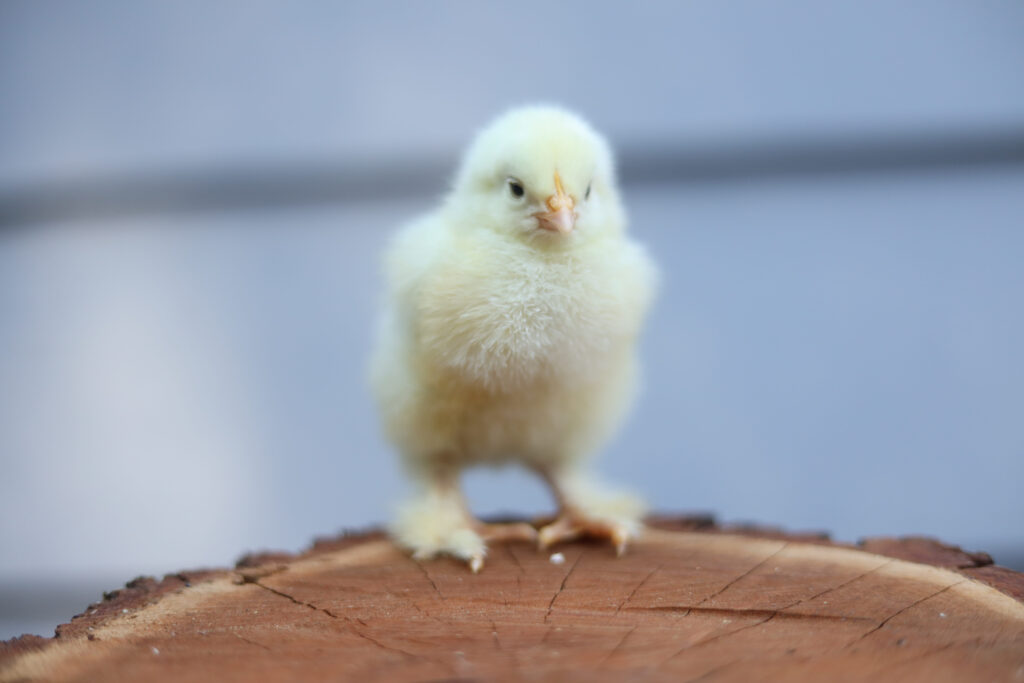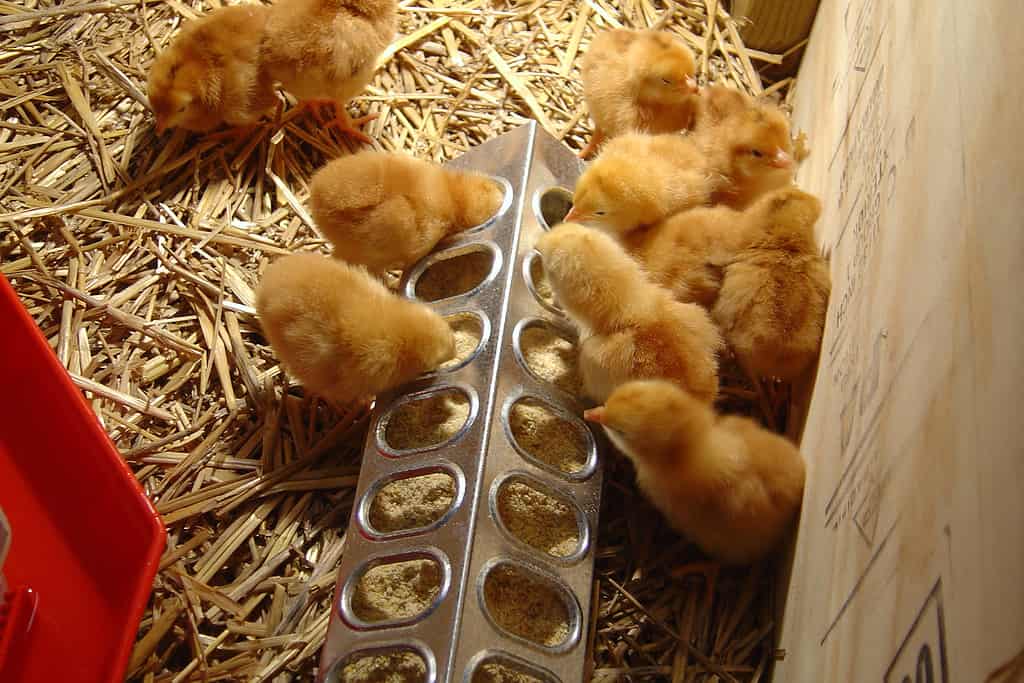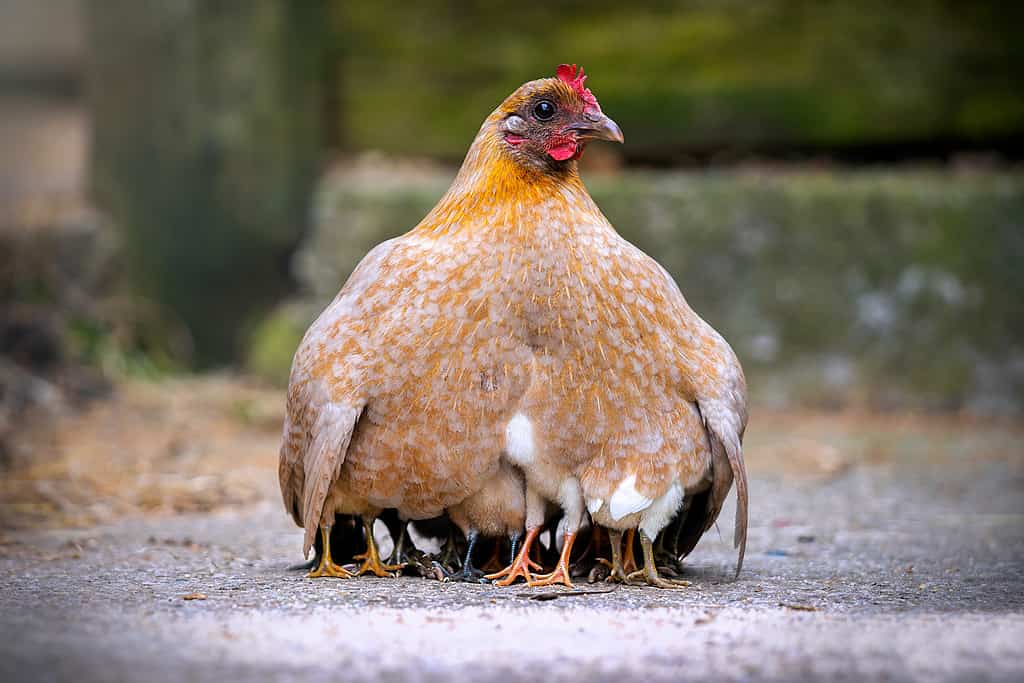Pasty butt may sound like an amusing condition, but it’s certainly no fun for the chickens experiencing it. Nor is it something owners want to deal with. So what exactly is pasty butt? And what causes it? Find out how to treat pasty butt in chicks, how to prevent it, and whether or not it’s contagious.

The best way to treat pasty butt in chicks is by using warm water to gently wash off the feces.
©LisaBee Imagery/Shutterstock.com
What Is Pasty Butt?
A pasty butt occurs when feces stick to a chick’s vent, preventing it from excreting. In chickens, the vent is the opening through which they excrete waste and lay eggs. Other terms for pasty butt include pasted vent, paste-up, pasting, and sticky bottoms. This is a common condition affecting young chickens.
A pasty butt is not contagious in and of itself. However, the same factors that cause the condition in one chick may cause it in another. It’s critical to identify the underlying causes to prevent an occurrence in multiple individuals, whether in large-scale or small-scale flocks.
How to Treat Pasty Butt in Chicks
The best way to treat pasty butt in chicks is to gently wash off the feces with warm water. This should be done with the utmost care as chicken skin is very delicate. Never attempt to pull off unloosened dried feces as this can tear the skin and pluck out feathers. Use warm water, not hot or cold, and don’t wet more of the chick than necessary as they chill easily.
Some excretions are easy to remove using warm water and your fingers. However, in some cases, you may need to use a soft, damp cloth or cotton swabs to loosen the feces. Again, this should be done using extreme care to prevent injury. A small amount of vegetable oil or petroleum jelly can help remove stubborn feces and prevent recurrence.
After removing the feces, thoroughly dry the chick using a soft, clean cloth and a hair dryer on low heat. Hold the hair dryer at least eight inches away from the skin to prevent burns. It is critical to ensure the chick does not go into hypothermia. If the chick’s body temperature drops too low, it may experience a recurrence of pasty butt as well as other health issues.
Depending on the underlying cause, you may need to consult a veterinarian for further treatment. This is especially true if the cause is an infection. Most birds with pasty butts will recover in three to 10 days if treatment is prompt.
What Causes Pasty Butt in Chicks?

Chicks can get pasty butt if their brooder is too warm or too cold.
©iStock.com/Jennifer Chamblee
Pasty butt can be caused by several factors, including the following:
Poorly Digestible Food
The most common cause of pasty butt is poorly digestible food or an improper diet. When chickens have trouble digesting food, it thickens the digesta in the intestine. This makes it viscous and prone to sticking. A newborn chick doesn’t produce sufficient digestive enzymes to efficiently break down feed, which is why the condition commonly affects chicks rather than adults. By 10-14 days of age, this should no longer be an issue.
Stress
Stress is a common cause of pasty butt in chicks as it easily upsets the digestive balance and encourages sticky excretions. The condition often occurs in chicks during or after transport as environmental changes can be highly stressful. Any newly-acquired chicks should be inspected for pasty butt and treated accordingly.
Extreme Temperatures
Chicks don’t respond well to temperature extremes, whether hot or cold. Overheating is usually the result of heat lamps while chicks in transport often endure chilly conditions. Again, any environmental changes or stresses easily contribute to digestive upset. Chicks raised by broody hens are less likely to develop pasty butts as the hen’s feathers protect them from both stress and cold temperatures.
Bacterial, Viral, or Parasitic Infections
Though it’s less common, bacterial, viral, or parasitic infections can cause pasty butt in chicks. Coccidiosis is an example of a common parasitic infection that may result in loose, sticky stools. While pasty butt isn’t contagious, some of the underlying infections may be.
How to Prevent Pasty Butt in Chicks

Broody hens help protect their chicks from pasty butts by keeping them warm and stress-free.
©Matthew Troke/iStock via Getty Images
There are several ways to prevent pasty butt in chicks, including the following:
- Monitor proactively. Check frequently for signs of pasty butt, especially in chicks that have already experienced it or are only a few days old.
- Practice good biosecurity. Among other things, ensure the litter is clean and dry and the water supply is clean.
- Reduce or remove stressors whenever possible.
- Regulate temperature. Ensure the brooder is set to the appropriate temperature. If several chicks are experiencing pasty butt, you may need to adjust the settings.
- Supply appropriate nutrition. Good nutrition is key to a chicken’s health. If the chick’s feed doesn’t contain a probiotic, consider adding one to its water. Also, don’t offer treats to chicks as this can upset their digestive balance.
Common Signs and Symptoms of Pasty Butt in Chicks
Common signs and symptoms of a pasty butt include:
- Stunted growth
- Lethargy
- Changes in eating and drinking patterns
- Inability to sleep
- Protruding vent
How to Check for Pasty Butt in Chicks
To check for pasty butt in chicks, simply pick the chick up and turn it over. You’ll find the vent directly under the tail. Make sure you don’t confuse it with the belly button, which is right beneath it and appears similar. If the vent is clogged with feces, address the issue immediately. Continue monitoring the chick for the next few days.
Does Pasty Butt Affect Adult Chickens?

Pasty butt most commonly affects very young chicks, not adult chickens.
©Aiselin82/iStock via Getty Images
Pasty butt can also affect adult chickens, though it’s far less common. Chickens have an easier time digesting food and handling stress than chicks, which means they’re less likely to develop digestive issues and sticky stools.
Is Pasty Butt Fatal?
Pasty butt is generally an easily treatable condition. However, if left untended, it can cause serious health issues and even death. A common condition caused by pasty butt is vent gleet, which is an inflammation of the vent or cloaca due to infection. Pasty butt may also recur in certain individuals, so it’s wise to monitor chicks that have already experienced it to ensure it doesn’t return.
Can Humans Get Pasty Butt from Chickens?
Because pasty butt is noncontagious, humans can’t contract it from chickens. Nevertheless, chicken handlers should always practice proper sanitation when handling feces or infected chicks.
Conclusion
The bottom line is, pasty butt in chicks is noncontagious and easily treatable. However, it does require prompt intervention to ensure it doesn’t cause other health complications.
The photo featured at the top of this post is © Toa55/iStock via Getty Images
Thank you for reading! Have some feedback for us? Contact the AZ Animals editorial team.







